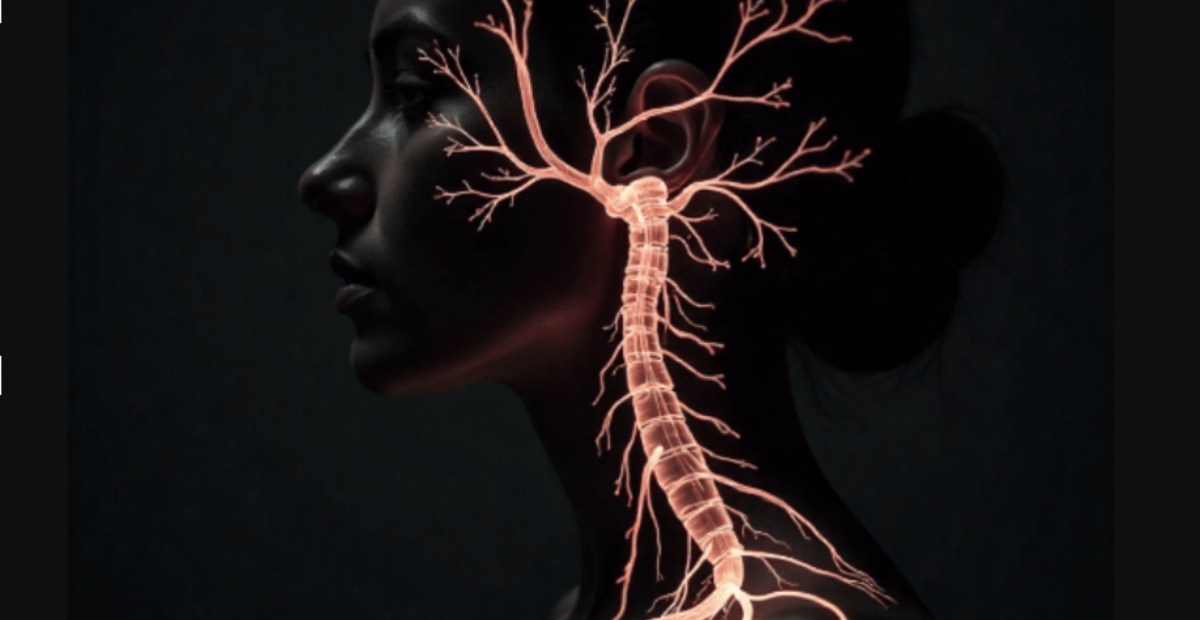What does the vagus nerve do, and why is it such an important part of our overall well-being? As one of the longest nerves in the body, it plays a key role in connecting the brain to many vital organs, influencing everything from digestion and heart rate to stress response and mood regulation.
This article will discuss the vagus nerve’s primary functions, its potential impact on mental and physical health, and ways to support its healthy activity. Whether you’re curious about natural stimulation methods or modern device-assisted approaches, continue reading to explore these topics in greater detail.
Anatomy & Pathways of the Vagus Nerve
When asking “what does the vagus nerve do?” it helps to begin with its structure. The vagus nerve, also known as the tenth cranial nerve, originates in the brainstem and travels down each side of the neck, branching into the chest and abdomen. Along its path, it connects to multiple organs, including the heart, lungs, and digestive tract.
These branches carry signals both from the brain to the body (motor functions) and from the body back to the brain (sensory feedback). This two-way communication makes it a vital part of the parasympathetic nervous system, which helps regulate functions related to rest, recovery, and balance.
Primary Functions of the Vagus Nerve
In answering “what does the vagus nerve do?”, one of the most important points is its involvement in maintaining homeostasis. This nerve helps manage heart rate, supports healthy digestion, and plays a role in controlling reflexes such as coughing and swallowing.
Its influence extends to:
-
Heart regulation – Helping maintain steady rhythms.
-
Digestive processes – Encouraging peristalsis and enzyme secretion.
-
Mood and stress modulation – Supporting relaxation responses.
-
Immune system communication – Assisting in inflammatory regulation.
While these functions are significant, their exact effects can vary between individuals. Medical professionals remain the best resource for interpreting symptoms or exploring possible vagus nerve issues.
Potential Health Benefits of a Well-Functioning Vagus Nerve

Those asking “what does the vagus nerve do?” often hear about its potential benefits. A well-functioning vagus nerve is associated with improved relaxation, better digestion, and emotional balance. It is also linked to efficient recovery after stress and may play a role in supporting healthy inflammatory responses.
It is essential to understand that these are associations, not guaranteed outcomes. Individual experiences can differ greatly, and research into the full scope of these benefits continues to evolve. Professional advice ensures that any efforts to support vagus nerve health are safe and appropriate for personal circumstances.
Signs Your Vagus Nerve May Not Be Functioning Optimally
Recognizing possible vagus nerve issues begins with answering “what does the vagus nerve do?” in normal operation. When the nerve’s signaling is not optimal, some people report symptoms such as digestive discomfort, irregular heart rhythms, or difficulties managing stress.
These signs are not diagnostic. They may overlap with other medical conditions, making it essential to seek a thorough evaluation from a healthcare provider. Only a qualified professional can determine whether symptoms are related to vagus nerve function or another cause entirely.
Ways to Support Vagus Nerve Health Naturally
For those exploring natural methods alongside the question “what does the vagus nerve do?”, certain lifestyle practices may help support its healthy function. These include:
-
Deep breathing exercises – Slow, diaphragmatic breathing can help activate the parasympathetic system.
-
Meditation and mindfulness – May promote relaxation and stress balance.
-
Gentle yoga or stretching – Encourages circulation and calm.
-
Cold exposure (with caution) – Brief, safe exposure may stimulate nerve response.
-
Singing, humming, or chanting – Engages the muscles connected to the nerve’s pathways.
It is wise to begin any new wellness practice gradually and, when in doubt, consult a healthcare provider, especially if managing chronic health conditions.
Modern Device Support for Vagus Nerve Function
Beyond natural practices, some individuals explore technology-based methods. Non-invasive vagus nerve stimulation (VNS) devices are designed to deliver mild electrical impulses near the ear or neck area, aiming to stimulate the nerve without surgery.
These tools may be appealing for those seeking structured, repeatable stimulation, but they are not a substitute for medical treatment. Professional guidance is essential before using any electrical stimulation device, particularly for people with heart conditions, neurological disorders, or implanted medical devices.
Product Spotlight: Neurive Healaon Pro Vagus Nerve Stimulator

The Neurive Healaon Pro Vagus Nerve Stimulator is a non-invasive, wearable device designed to provide gentle stimulation to the vagus nerve through an ergonomic ear-clip. With adjustable settings and a lightweight design, it is intended for convenience in a variety of settings, from home to travel. While some users have described feelings of calm, focus, or better rest after use, experiences can vary.
Key Features:
-
Adjustable stimulation settings for personalized comfort
-
Ergonomic ear-clip design for secure, stable placement
-
Lightweight and portable for flexible use
-
Simple, user-friendly interface for easy operation
-
Multiple modes to suit different preferences
While the Neurive Healaon Pro may complement certain wellness approaches, it is essential to consult a qualified healthcare professional before use, especially for individuals with heart conditions, neurological disorders, implanted devices, or other medical considerations.
Safety Considerations & Professional Guidance
Understanding what the vagus nerve does also means recognizing that overstimulation or misuse can lead to unwanted effects. Even with consumer-grade devices, mild side effects such as tingling, skin irritation, or temporary discomfort are possible.
Professional guidance is particularly important for people with cardiovascular concerns, implanted devices like pacemakers, neurological conditions, recent surgeries, or those who are pregnant. A healthcare provider can determine whether vagus nerve stimulation is a safe choice and help establish appropriate usage guidelines.
Taking the Next Step: Safe and Informed Vagus Nerve Support
Understanding the vagus nerve’s role can offer insight into its influence on many aspects of health, from digestion to stress recovery. While there are various ways to support its function, beginning with professional guidance is the most reliable and safest approach.
“What does the vagus nerve do?” is a question that connects directly to wellness routines and relaxation practices. The Neurive Healaon Pro Vagus Nerve Stimulator offers a portable, non-invasive option for gentle at-home stimulation. For more details and personalized advice on whether this device may suit your needs, contact Airvida Chambers today.
FAQs
What are the symptoms of a vagus nerve problem?
Possible signs of vagus nerve dysfunction can vary, but some people report digestive discomfort, irregular heart rhythms, dizziness, or difficulty swallowing. These symptoms may also stem from unrelated conditions, so a healthcare professional’s evaluation is essential to identify the true cause and determine the most suitable next steps.
How to reset the vagus nerve?
Gentle techniques sometimes explored for vagus nerve support include deep breathing exercises, mindfulness meditation, singing, and light physical activity. These methods may encourage relaxation, but responses can differ among individuals. Consulting a qualified healthcare provider before beginning any new routine helps ensure safety and suitability for personal health circumstances.
What does the vagus nerve do in anxiety?
The vagus nerve plays a role in the parasympathetic nervous system, which helps regulate the body’s “rest and digest” functions. Some theories suggest it may influence how the body recovers from stress. However, its role in anxiety is complex, and professional guidance remains essential for understanding individual situations.
How to know if the vagus nerve is compressed?
Vagus nerve compression is uncommon but may be suspected if certain neurological or digestive symptoms occur. Because these signs often overlap with other medical issues, only a qualified healthcare provider can assess and confirm whether compression exists, often through physical examination, medical history, and appropriate diagnostic testing.
Why should you activate your vagus nerve?
Some people explore vagus nerve activation as a way to support relaxation, digestion, and overall balance. While potential benefits are discussed in wellness contexts, individual results vary, and the scientific understanding is still evolving. A healthcare provider can help determine whether such practices are suitable for personal health needs.
You May Also Want to Read
Red Light Therapy vs Infrared Sauna: Which Is Better?
Do Leg Compression Machines Work? Real Benefits You Should Know
Exploring the Top Hyperbaric Chamber Benefits for Long-Term Wellness




